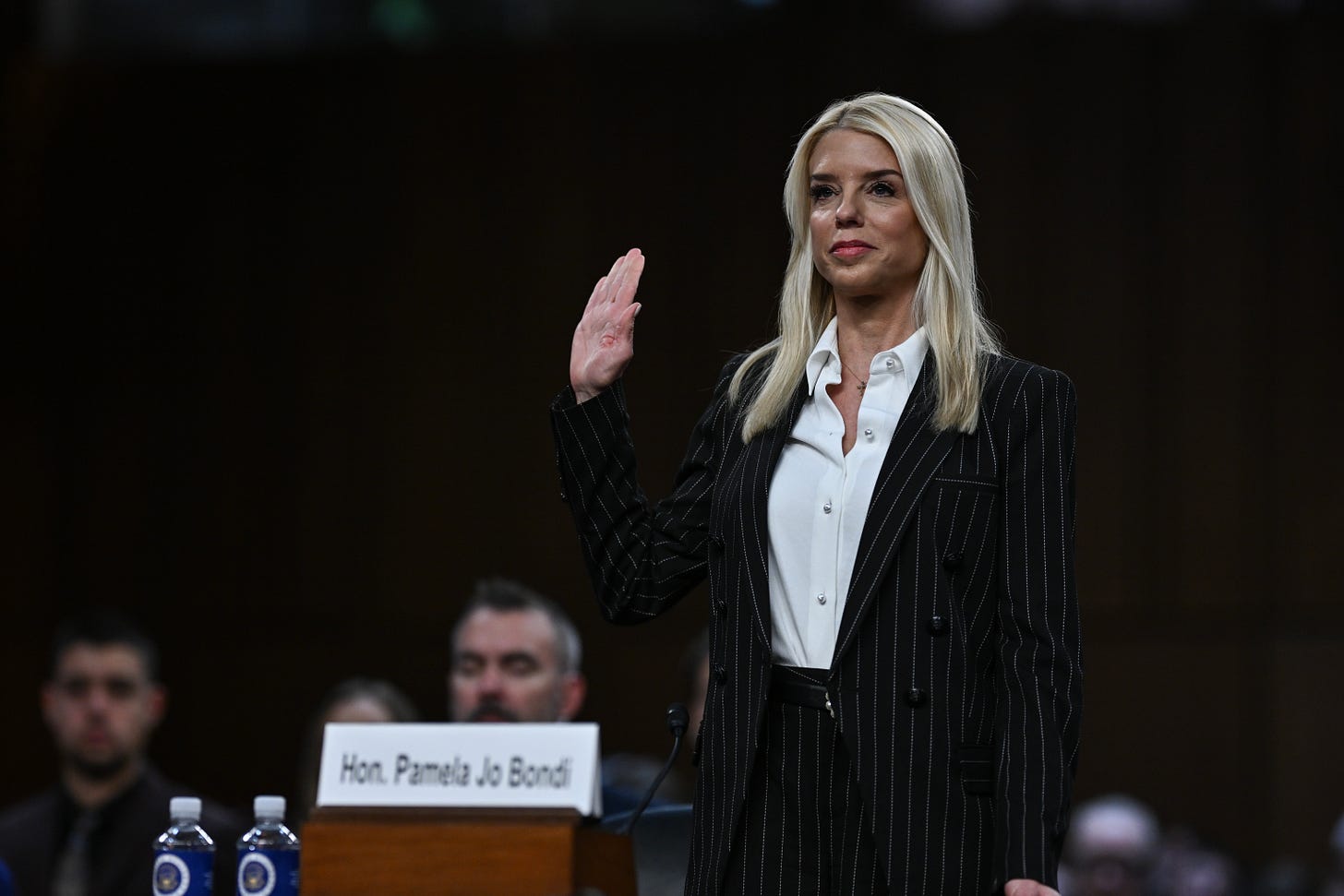Trump's lawyers won't stop lying in court
It's past time for judges to stop giving them the benefit of the doubt.
PN is supported by paid subscribers. Become one 👇
Unless you are some sort of administrative law nerd, you might have managed never to learn about the presumptions of regularity and good faith.
The notion that executive branch employees should be presumed to be lawfully and correctly discharging their duties is such an old one that it well predates the founding of the United States — but it’s one that’s no longer viable in the age of Donald Trump.
It’s impossible in one article to detail all the times in the last seven months that the administration has been flagrantly lying about the reasons for its actions. But the most recent example is Judge Allison Burroughs’s 84-page smackdown of Trump’s efforts to make Harvard University bend the knee.
There, Judge Burroughs pointed out that though the administration said the ostensible reason for withholding $2.6 billion in research funding was because Harvard was failing to address antisemitism, that was really just a straight-up lie: “Defendants used antisemitism as a smokescreen for a targeted, ideologically-motivated assault on this country’s premier universities.” The administration’s actions made clear that the goal was to retaliate against Harvard for not buckling.
The core of the presumptions of regularity and good faith is this: Without clear evidence to the contrary, the federal courts should presume that government employees have properly discharged their official duties. That doesn’t mean courts have to sign off on everything officials do, but it does mean that the default is presuming that government employees are undertaking their duties in a lawful fashion and not lying to the court about them.
There is a good, intuitive reason for these presumptions, and it becomes easier to see when you think about smaller agency actions rather than the catastrophic, democracy-destroying ones we’re dealing with these days. Without them, a fact-free, vibes-based assertion that a government official had an improper motivation for their actions or was lying to the court would require the judges to engage in a lengthy, full-fledged inquiry into the government’s reasoning every time.
Imagine an unhappy plaintiff who runs a trucking company and is certain that the Department of Transportation improperly denied their application for a certificate allowing them to transport goods across state lines. If that plaintiff just says, without any evidence, that all DOT employees are secretly in cahoots because those employees hate the plaintiff’s mother, an agency would be drawn into having to explain all its internal deliberations to show they’ve never even heard of the plaintiff or their mother. That’s a mess, and could grind executive branch agencies to a halt, so the default assumption is that the DOT acted appropriately.
However, this is a rebuttable presumption, which means that if the plaintiff can point to evidence of irregularity or bad faith, then the government doesn’t get the benefit of the doubt. If the plaintiff can provide evidence that DOT employees treated their application differently from that of other companies without any justification, or show that DOT employees were lying to the court about the reasons for rejecting the application, they may be able to move forward.
Much of the current discussion about the administration’s truthfulness has centered on what DOJ attorneys are telling the courts. But equally problematic is the indefensible actions of members of the executive branch.
Endless contempt
During Trump’s first term, the presumption of regularity came up when the administration tried to add a citizenship question to the census but basically straight-up lied about the reason, with then-Secretary of Commerce Wilbur Ross saying it was prompted by a Justice Department request to protect minority voters.
In that instance, the Supreme Court said the administration’s rationale was “contrived” and didn’t match the record of the agency’s decision-making process. In this situation, then, it was Ross’s deception at issue, not whatever DOJ lawyer got tasked with making the argument.
A different president might have taken this as a sign to ensure that there is always a detailed agency record justifying a decision. But not Trump. Perhaps emboldened by the Supreme Court’s sweet gift of immunity, Trump’s second term has been marked by open and obvious lies about the reasons for agency actions and open and obvious lies to the courts about them.
A recent decision, Federal Education Association v. Trump, is a helpful, dreadful laundry list of times the lower courts have found that the administration does not deserve the presumption of regularity.
The FEA case is one of a number dealing with Trump’s unilateral decision to remove union protections from roughly two-thirds of the federal workforce. The stated reason was disclosed in a March executive order in which Trump declared that over 40 agencies and agency subdivisions had intelligence, investigative, or national security work as their primary function, which allowed him to end collective bargaining rights for them.
There is indeed a law that allows the president to exempt certain employees from collective bargaining if their primary purpose is related to national security interests. But it was likely surprising to federal employees working in, say, the Animal and Plant Health Inspection Service or the Centers for Disease Control and Prevention to learn they were actually engaged in intelligence or national security work.
In the FEA case, the administration made it easy for plaintiffs to rebut the presumption of regularity. That’s because while the executive order said that Trump was ending collective bargaining for national security reasons, the administration’s own fact sheet about the order directly said he was punishing unions for opposing him:
Certain Federal unions have declared war on President Trump’s agenda. The largest Federal union describes itself as “fighting back” against Trump. It is widely filing grievances to block Trump policies. For example, VA’s unions have filed 70 national and local grievances over President Trump’s policies since the inauguration — an average of over one a day.
There’s no world where a union doing what unions are entitled to do and supposed to do — represent the interests of workers via normal channels like filing grievances — constitutes a national security risk. As a result, lower court judges have ruled that the administration isn’t entitled to the presumption here, because the invocation of national security was just a fig leaf to bust unions.
Trump also tripped himself up with his executive orders targeting law firms, stripping them of security clearances, restricting them from federal buildings, and generally threatening their very existence.
Take Trump’s order targeting WilmerHale. It starts with the pretense that the firm is somehow obstructing efforts to prosecute undocumented people for drug trafficking, degrading elections by supporting efforts to allow noncitizens to vote, and discriminating in hiring based on race. Setting aside that even if those things were true, it wouldn’t justify Trump’s actions, he didn’t stop there.
Trump’s order revealed the real reason he hates WilmerHale: because former special counsel Robert Mueller and other lawyers who worked on the investigation into Russian interference in the 2016 election worked there:
Mueller’s “investigation” upended the lives of public servants in my Administration who were summoned before “prosecutors” with the effect of interfering in their ability to fulfill the mandates of my first term agenda. This weaponization of the justice system must not be rewarded, let alone condoned.
There, the lower court noted that it didn’t even need to look outside the text of the executive order to see that the stated reason for going after WilmerHale was a lie. Trump literally stated that he was retaliating against the firm for the clients it represents and the people it hires.
Or how about the time that the administration decided to terminate Maine’s federal education funding because the state would not comply with Trump’s executive order banning trans athletes? There, the issue wasn’t that there was a mismatch between the stated reason for the funding freeze and the real reason. Instead, it was that the administration didn’t follow any of the normal, required procedural steps to suspend or terminate funding.
Before yanking federal funding, the administration is required to try to secure voluntary compliance. If that fails, then there must be an opportunity for a hearing, express findings on the record, approval by the secretary of agriculture, filing with the relevant legislative committees, and a 30-day waiting period. None of those things happened, so the administration couldn’t claim it was just following its regular procedures.
The system isn’t designed for this
This isn’t all at the feet of Trump and his cabinet — DOJ attorneys have played a depressingly significant role too.
Someone has to go to court and defend the administration’s lawlessness. Sometimes, the government’s attorneys aren’t being unethical as such, but they are showing up to court with shoddy arguments, ill-prepared to answer questions, and generally behaving poorly.
That’s a new, Trump-era development. DOJ lawyers have generally enjoyed deference from federal judges, but, as John E. Jones III, a former federal judge appointed by George W. Bush, put it, they have now “lost a fair measure of their credibility.”
If you want to know what that loss of credibility looks like in practice, look no further than Deputy Assistant AG Drew Ensign, who has been eager to defend the administration’s deportations in court.
When Ensign showed up to argue that it was indeed super cool and good to deport literal children to Guatemala, he was faced with a judge who, rightly, didn’t give him any benefit of the doubt. That’s because the administration’s actions here — hustling deportees onto a plane and out of the country as quickly and secretly as possible — looked a lot like what happened in JGG v. Trump, where Ensign defied Judge James Boasberg’s order to turn around planes flying deportees to El Salvador’s CECOT prison.
Judge Sparkle Sooknanan was well aware of all this, so when Ensign showed up to dither and dissemble as to whether or not a planeload of children was going to imminently depart for Guatemala, it didn’t go well. To avoid a repeat of JGG, Sooknanan had to dog Ensign every step of the way, ensuring he contacted his client, getting status reports as to each child, and tenaciously making sure no planes took off.
Judges shouldn’t have to do this, and they don’t want to. The entire point of presuming that the government comes to the courts with clean hands is that judges are not forced to spend days on end making sure officials follow court orders. The reasons career DOJ attorneys routinely appear before courts is that judges expect them to be prepared and to have adequate justification for government actions.
The real problem here is that there are very few mechanisms available to impose consequences on high-level appointees and government lawyers. Judge James Boasberg found, all the way back in April, that there was probable cause to hold the government in criminal contempt for disregarding his order to turn planes bound for CECOT around, and then refusing to adequately explain its reasoning. But then the DC Circuit Court of Appeals stepped in and put Boasberg’s order on hold. And then the DC Circuit just did … nothing … for three months.
Helpfully, during those three months, Emil Bove had his confirmation hearing for his Third Circuit Court of Appeals job. Since the DC Circuit was just sitting on the contempt order rather than letting it proceed through Boasberg’s court, Bove had never been required to answer anything under court oath about his behavior in telling DOJ attorneys to ignore court orders. Then, only a week after Bove was confirmed, the DC Circuit suddenly remembered it had to rule on Boasberg’s contempt finding — and they just threw it out entirely.
The courts have no roadmap for this. They have generally not been faced with repeated instances of high-level government officials and attorneys routinely lying or perpetually insisting they have no idea what’s actually going on, but that’s where we are now, and it’s where we have been for several months.
Ultimately, any sanctions or other consequences that judges try to impose will run headlong into a Supreme Court that seems inclined not just to look the other way, but to actively help the Trump administration defy the lower courts. Judge Sooknanan’s handling of Ensign, however, is something lower courts can still do, and she gave a master class in how to do it. The administration — both its high-level appointees and DOJ lawyers — should be boxed in by judges who won’t rest until they have confirmation that the administration has followed their orders.
The administration is now the worst possible litigant, constantly belligerent and willfully defiant, and not a single person speaking on its behalf, from Trump to the lowliest newbie DOJ lawyer, should be given the benefit of the doubt ever again.
That’s it for today
We’ll be back with a special Saturday edition tomorrow. If you appreciate today’s PN, please do your part to keep us free by signing up for a paid subscription.
Thanks for reading, and for your support.









I've long thought I was pretty well informed about how "government" worked (and didn't), but Trump II has taught me things I never thought of, especially about how crucial custom and precedent are to keep things working.
My big fear at this point is that when we get through this -- we *will* get through this -- mostly well intentioned people will try to fix all the broken parts but their efforts will probably make things worse. Because meticulously drafted, written-down laws can't substitute for essential customs that most of us are willing to abide by.
"The best lack all conviction,
While the worst are full of passionate intensity."
And small brains, bloated with the presumed blessing of Jesus.
Press on to commit atrocities under the cloak of a religious imperative